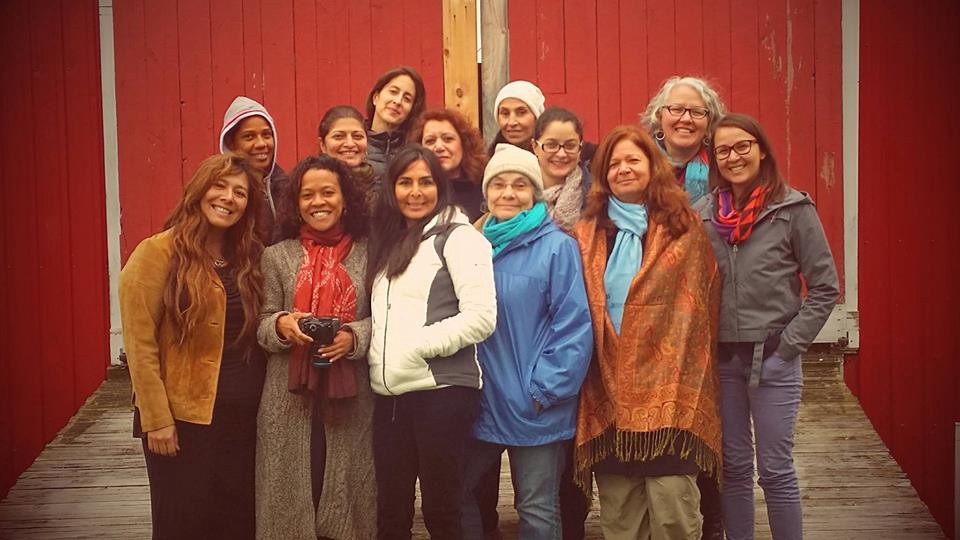Spotting a woman director of color helming a studio film or
showrunning for a network can be like finding a Puya Raimondi — that rare flower that blooms every 100 years. There are plenty of incredible women
directors and screenwriters of color, and a few, such as Shonda Rhimes and Mira
Nair, have shown that their work can be successful in the mainstream, but the
industry has yet to offer most diverse women directors opportunities
commensurate with their talent and demographics.
“That’s why we started our Diverse Women’s Initiative —
and the Artist Retreat Center is a centerpiece for us,” explained Axel
Caballero, Executive Director of NALIP, the National Association of Latino
Independent Producers. “When our
Trustee, Maria Agui Carter, floated the idea of creating this unique opportunity
for diverse women screenwriters and directors, we knew we would be serving a
vast, unmet need.”
The next residency program for the NALIP Artist Retreat Center (ARC) for women filmmakers
of color will take place on October 1–11, 2015. Up to ten exceptional women will be invited to workshop their projects on a private 100-acre farm
in northeastern Vermont during prime New England foliage-viewing season. 2014 ARC Fellow Yvonne Russo, a seasoned Native American producer and
director now working on the new HBO series “Lewis and Clark” with Tom Hanks,
Edward Norton and Brad Pitt, called her experience at last year’s retreat “an
opportunity of a lifetime.”
NALIP has seen an exponential growth in membership and their
media work, including by producers, directors and writers. Latinos are over-represented among TV viewers and purchase one in
every four movie tickets, so it would seem natural that the industry would be
making room for Latino media-makers with open arms.
But a study
commissioned by NALIP found that, from 2010 to 2013, Latinos made up only 4.1% of
TV directors, 1.2% of producers and 1.9% of writers. In movies, Latinos accounted for 2.3%
of movie directors, just over 2% of producers, and 6% of writers.
No Latinos currently serve as CEOs, presidents or owners of major English-language
networks or studios. Divide those numbers
by gender, and one begins to understand how difficult the road for a Latina
woman director and screenwriter can be.
Statistics are inequitable for all women directors, but they
are especially so for diverse women. Few
programs focus on helping to fight the many layers of additional challenges —
psychological, social, political and economic — that women of color face in
getting their films made and distributed.
The residencies for diverse women at the NALIP ARC allow
each artist uninterrupted time and space to work in an inspiring environment. Also on offer are
career-sustainability and artistic-empowerment workshops, plus group
and individual mentoring. Last year’s
mentors included Cynthia Lopez, NYC Commissioner of Film and Entertainment, the
first woman of color in this powerful role. “Cynthia’s
presentation moved me to tears. I
realized, then, what the ARC could be. Cynthia acknowledged a very important
theme — the importance of community, of supporting each other, to raise the
bar,” explains Latina ARC 2014 Fellow Nina Alvarez, winner of a news and documentary Emmy and Peabody.
“The ARC Residency enabled me to drill down to the film’s
creative core and make decisions about the project that will affect the course
of production and my career. Priceless,” says Latina filmmaker and 2014 ARC
Fellow Xan Aranda, who was recently nominated for an Emmy for her latest
work alongside collaborator Jill Soloway for “This is Me,” a five-part shorts docu-series.
The NALIP ARC creates an inspiring environment to concentrate
on work and reflection during the day, with chef-prepared farm-to-table meals and
evening presentations and discussion of each artist’s work. The Fellows
stay in country houses on a Vermont estate overlooking organic hay fields,
forests, mountains and a private pond, all within walking distance to the largest
waterfall in Vermont.
There is no cost for the residency, and a limited
number of scholarships are available to offset travel and food costs. Applications are due August 17, 2015. Apply and get more information here.
Maria Agui
Carter is an award-winning writer and director whose most recent national PBS documentary, “Rebel,” won a 2014 Erik Barnouw
Award for best historical films in America. Her new magical realist narrative script, “The Secret Life of La Mariposa”
is a Sundance Screenwriters Lab finalist.







